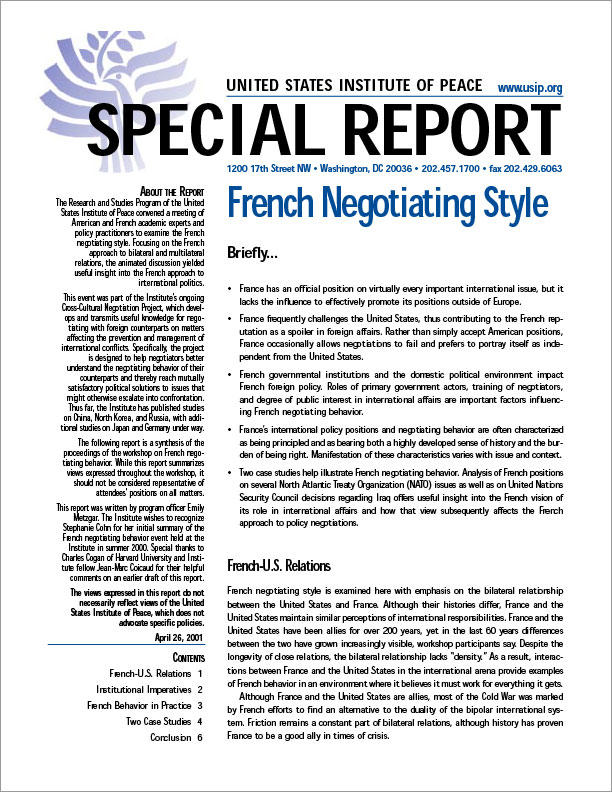The Research and Studies Program of the United States Institute of Peace convened a meeting of American and French academic experts and policy practitioners to examine the French negotiating style. Focusing on the French approach to bilateral and multilateral relations, the animated discussion yielded useful insight into the French approach to international politics.

Summary
- France has an official position on virtually every important international issue, but it lacks the influence to effectively promote its positions outside of Europe.
- France frequently challenges the United States, thus contributing to the French reputation as a spoiler in foreign affairs. Rather than simply accept American positions, France occasionally allows negotiations to fail and prefers to portray itself as independent from the United States.
- French governmental institutions and the domestic political environment impact French foreign policy. Roles of primary government actors, training of negotiators, and degree of public interest in international affairs are important factors influencing French negotiating behavior.
- France's international policy positions and negotiating behavior are often characterized as being principled and as bearing both a highly developed sense of history and the burden of being right. Manifestation of these characteristics varies with issue and context.
- Two case studies help illustrate French negotiating behavior. Analysis of French positions on several North Atlantic Treaty Organization (NATO) issues as well as on United Nations Security Council decisions regarding Iraq offers useful insight into the French vision of its role in international affairs and how that view subsequently affects the French approach to policy negotiations.
About the Report
The Research and Studies Program of the United States Institute of Peace convened a meeting of American and French academic experts and policy practitioners to examine the French negotiating style. Focusing on the French approach to bilateral and multilateral relations, the animated discussion yielded useful insight into the French approach to international politics.
This event was part of the Institute's ongoing Cross-Cultural Negotiation Project, which develops and transmits useful knowledge for negotiating with foreign counterparts on matters affecting the prevention and management of international conflicts. Specifically, the project is designed to help negotiators better understand the negotiating behavior of their counterparts and thereby reach mutually satisfactory political solutions to issues that might otherwise escalate into confrontation. Thus far, the Institute has published studies on China, North Korea, and Russia, with additional studies on Japan and Germany under way.
The report is a synthesis of the proceedings of the workshop on French negotiating behavior. While this report summarizes views expressed throughout the workshop, it should not be considered representative of attendees' positions on all matters.
This report was written by program officer Emily Metzgar. The Institute wishes to recognize Stephanie Cohn for her initial summary of the French negotiating behavior event held at the Institute in summer 2000. Special thanks to Charles Cogan of Harvard University and Institute fellow Jean-Marc Coicaud for their helpful comments on an earlier draft of this report.
The views expressed in this report do not necessarily reflect those of the United States Institute of Peace, which does not advocate specific policies.